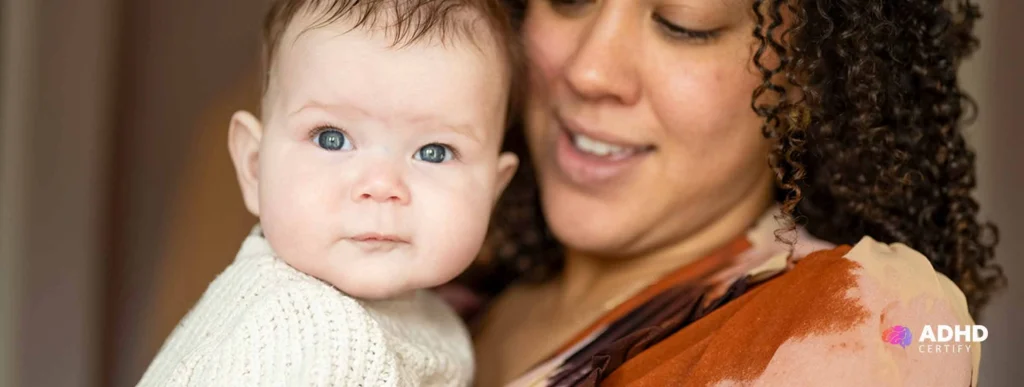Many mums on maternity leave with ADHD find themselves blindsided by how invisible and intense the struggle can be.
It’s not just new mum tiredness, the sudden loss of routine, crashing hormones, and relentless caregiving form a perfect storm of ADHD maternity leave overwhelm.
You might quietly be wondering, why is this so much harder than I expected?
Research from the Office for Health Improvement and Disparities (OHID) found that 25.8% of new mothers in England experience perinatal mental health conditions, underlining the widespread emotional strain during this phase.
This isn’t a failing, it’s a neurodivergent experience that’s rarely named or discussed.
Without external structure, ADHD and postnatal challenges can slide from manageable to overwhelming, so let’s explore why the beginning of this journey can feel like your brain has hit a wall.
Key Takeaways
- ADHD doesn’t take maternity leave. The sudden loss of routine, hormonal shifts, and constant caregiving can make ADHD symptoms feel louder and more unmanageable during this time.
- It’s not just tiredness. Executive dysfunction, emotional dysregulation, sensory overload, and identity loss hit differently when you’re neurodivergent and looking after a newborn.
- You’re not imagining it; this is hard. Many mums with ADHD find themselves blindsided by the emotional and cognitive weight of early motherhood. You’re not alone, and it’s not a personal failing.
- Structure helps, even tiny bits of it. Daily anchors, visual reminders, micro-rest moments, and asking for help (yes, even when it feels awkward) can make a real difference.
- There is support, and you deserve it. Whether it’s peer stories, NHS perinatal services, or a formal ADHD assessment, help exists and seeking it is a step toward feeling more like you again.
Why Maternity Leave Can Trigger ADHD Challenges
Without the external structure of work, many ADHD symptoms intensify, often catching new parents off guard.
Executive Dysfunction Without a Schedule
The shift from a structured work environment to the open-ended, flexible nature of maternity leave with ADHD can feel like the ground beneath you has disappeared.
With no meetings or deadlines to serve as anchors, ADHD executive dysfunction can quickly spiral. Time blindness becomes more pronounced, leading to a sense of inertia, and feelings of guilt that you’re not doing enough, even though you’re completely exhausted.
For many women with inattentive-type ADHD, the lack of structure during maternity leave can cause their symptoms to spiral, often without them even realising what’s happening.
If you’ve always been “daydreamy,” forgetful, or mentally scattered, this might help explain the intensifying overwhelm.
Emotional Dysregulation and Hormonal Flux
The hormonal shifts that come with childbirth don’t just affect your body; they also have a profound impact on your ADHD emotional regulation.
Mood swings and overstimulation are common, making emotional fragility feel even more pronounced. The normal rollercoaster of motherhood, coupled with ADHD emotional dysregulation, can amplify the highs and lows, leaving you feeling as though your emotions are out of your control.
Sensory Overload and Touch Fatigue
On top of the emotional and cognitive challenges, ADHD and sensory overload can be a constant battle during maternity leave.
The constant noise, physical touch, and disrupted sleep can overwhelm your senses to the point where it feels like you’re drowning in stimuli.
For those with ADHD, the need for alone time and quiet moments becomes critical, but it can often feel impossible to carve out that space with a baby demanding constant attention.
The Mental Load of Motherhood Hits Differently with ADHD
The invisible labour of planning, remembering, and reacting can overwhelm even the most loving, attentive parent.
Remembering Everything and Dropping the Ball Anyway
Maternity leave often means managing a million small tasks such as appointments, feeding times, baby clothes sizing, and ADHD forgetfulness can make it feel impossible to keep track. This constant mental juggling adds a layer of anxiety and shame when things inevitably slip through the cracks, even when you’re doing your best.
Comparison Trap with Other Parents
The pressure to measure up to other parents can be suffocating. Whether it’s guilt over the mess, late paperwork, or missing moments, it can feel like you’re failing.
Social media doesn’t help, it can amplify feelings of inadequacy, triggering a spiral of self-doubt and reinforcing the belief that you’re “not doing enough.”
Losing a Sense of Self
The demands of motherhood leave little room for personal interests or pursuits. Without time for hyperfocus or creative flow, you might find yourself experiencing an identity crisis. That nagging feeling of “I’m not myself anymore” is common for neurodivergent mothers trying to balance the demands of their own needs with the needs of their baby.
Lived Experience: What Other Parents Say
Many women don’t realise how deeply ADHD affects their perinatal experience, until they’re in the thick of it.
A common theme that emerges across forums like Mumsnet ADHD boards, Reddit ADHDWomen, and Neurodivergent Motherhood groups is the intense struggle many new mothers with ADHD face.
One parent shared:
“I kept forgetting feeds and then crying because I felt like a failure.”
Another said:
“I went from high-performing to completely frozen. No one warned me.”
These real, lived experiences highlight the disconnect between external expectations and the internal reality for mothers navigating ADHD postnatal challenges.
It’s crucial to remember that these feelings are not unique to you, they are part of a shared experience for many neurodivergent parents.
These struggles are often brushed off as “just new mum stress”, but they could be pointing to something deeper. If you’re wondering whether ADHD might be part of your experience, this comprehensive guide can help you explore that more clearly.
Practical Coping Strategies That Can Help
You can’t organise your way out of ADHD, but you can build scaffolding that makes things easier.
Create Anchor Points for Your Day
To counteract the ADHD executive dysfunction that comes with maternity leave, creating small, achievable anchors can help. Use alarms for key events like naps, bottle times, and meals. It’s also helpful to keep a “minimum list” for the day, just three wins, so you can feel a sense of accomplishment.
Externalise Everything
Don’t rely on your memory when your brain is overloaded.
Externalising tasks can take a huge load off. Use whiteboards, sticky notes, or visual planners to keep important things in view. This can act as an organisational lifeline when ADHD and motherhood feel like too much to juggle.
Build in Micro-Rest + Low-Stim Moments
With the constant demands of a newborn, it’s easy to feel burnt out. It’s essential to create moments of quiet and rest. Hide in the loo, wear earplugs, or hand the baby off to someone for a moment of recharge.
Rest without guilt, it’s necessary for your well-being.
Ask for Help (Even If It Feels Like a Failure)
Asking for help might feel like admitting you’re not coping, but it’s actually a sign of strength. Whether it’s leaning on your partner, calling in family help, getting a night doula, or connecting with NHS perinatal mental health services, support is vital.
It’s not weakness, it’s building a strong foundation for both you and your baby.
When to Seek Further Help
If the overwhelm becomes too big to manage alone, there is professional support available.
If You’re Struggling to Bond or Care for Yourself
If you find it hard to bond with your baby or care for your own basic needs, this could be a sign of postnatal depression combined with ADHD emotional dysregulation.
These conditions often co-exist, so it’s important to recognise that it’s not a case of “either/or”, you deserve support for both.
If Shutdowns or Meltdowns Are Frequent
ADHD and emotional dysregulation post-birth can lead to emotional shutdowns or meltdowns, which may feel intense and overwhelming. If these become frequent, it’s important to reach out for help, as these symptoms are often exacerbated by the transition to motherhood and may require professional intervention.
If You Suspect You Might Have Undiagnosed ADHD
If the challenges of motherhood are triggering an overwhelming sense of mental overload, it could be time to explore the possibility of undiagnosed ADHD.
Actress and author Samantha Baines shared how the combination of motherhood and mental strain led her to seek an ADHD diagnosis, and how life-changing that decision was.
Her story is both honest and hopeful.
Birth can sometimes be the “unmasking” moment, if you think ADHD might be part of your experience, seeking an ADHD assessment could be life-changing. ADHD assessment services UK can help guide you through this journey.
Returning to Work with ADHD: The Other Side of Maternity Leave
Going back to work after maternity leave with ADHD isn’t just about adjusting your schedule, it’s about facing a system that may not understand how your brain actually works. From legal rights to emotional whiplash and the tricky question of disclosure, here’s what to consider as you re-enter the workplace.
1. When the Workplace Isn’t Built for Your Brain
The legal side rarely gets talked about, but it matters. Under the UK’s Equality Act 2010, ADHD is classed as a disability. That means if you disclose it, your employer is legally required to make reasonable adjustments so you can do your job without being chronically overwhelmed or unsupported.
This might include:
- Flexible hours or remote work
- Written task instructions
- Extended deadlines
- Quiet spaces or noise-cancelling headphones
- Reduced multitasking demands
But knowing you can ask and feeling safe enough to do it are two very different things.
ADHD is often misunderstood, and many women, especially those diagnosed later in life, worry about being seen as “flaky” or “dramatic.”
Which brings us to the next part.
2. I Don’t Know Who I Am at Work Anymore
Returning to work after maternity leave can already feel jarring, but add ADHD to the mix, and it can tip into identity whiplash.
You might have gone from high-performing professional to overwhelmed parent in a matter of months. Now you’re expected to switch back, pick up the pace, and “hit the ground running” like nothing’s changed.
But everything has changed.
The fog, the executive dysfunction, the emotional volatility, it’s not just sleep deprivation. It’s a brain still recalibrating. And if you were recently diagnosed (or just starting to suspect ADHD), this might be the first time you’re seeing your work habits and struggles in a new light.
You’re not lazy. You’re not unmotivated. You’re managing a neurodevelopmental condition while re-entering a world that expects you to “bounce back” without a second thought.
3. Disclosure, Support, and the Grey Areas In Between
So, should you tell your employer?
Should you keep it private?
Should you ask for help or stay quiet to avoid being judged?
There’s no one-size-fits-all answer, and that’s what makes this so difficult.
Some workplaces are incredible: understanding, accommodating, proactive. Others… aren’t. Many women fear being written off, micromanaged, or treated differently. And with ADHD’s invisibility, you’re often stuck explaining things that don’t seem “serious” to others but make or break your ability to function.
The best place to start? Know your rights.
ADHD is recognised.
Accommodations are legal.
You don’t need to be at breaking point to ask for support.
But also: trust your gut. Disclosure is a deeply personal choice. If you’re not ready, that’s okay. If you are, the first step might be a quiet conversation with HR, a trusted manager, or an occupational health advisor.
Final Thoughts
Navigating maternity leave with ADHD is not a sign of failure, it’s an ongoing challenge that deserves recognition and support.
You are not lazy or broken; you are managing something real and heavy.
Maternity leave with ADHD isn’t all soft cuddles; it’s a cognitive and emotional marathon, with unique struggles that are often misunderstood.
It’s important to recognise when things feel too much and seek support, rather than trying to soldier through it alone. Whether you’re feeling overwhelmed by the loss of structure, struggling with ADHD emotional dysregulation, or questioning if ADHD is part of your experience, help is available.
ADHD Certify offers assessments and support services tailored to those managing late-diagnosed ADHD and motherhood.
Take the first step today with a free ADHD self-screening test or explore our adult ADHD assessment services to get the professional help you deserve.
Frequently Asked Questions
Can maternity leave reveal undiagnosed ADHD?
Yes, the loss of routine and structure during maternity leave can make undiagnosed ADHD symptoms more noticeable, as the absence of external anchors can amplify difficulties with focus, time management, and emotional regulation.
Why does time feel strange and overwhelming with a new baby?
Time blindness is common in ADHD, and with a newborn, the lack of sleep, constant demands, and irregular schedule can make time feel distorted and overwhelming, especially without the usual structure of work.
How can I manage ADHD burnout during early motherhood?
To manage ADHD burnout, create small routines, build in rest moments, and don’t hesitate to ask for help. Finding time to recharge and not pushing yourself too hard is key.
What should I do if I feel I’m “failing” at parenting because of ADHD?
You are not failing.
ADHD makes certain tasks harder, but seeking help, setting realistic expectations, and being kind to yourself can help manage these challenges.
Can hormones worsen ADHD symptoms after birth?
Yes, post-birth hormonal shifts can amplify ADHD symptoms, particularly emotional dysregulation and mood swings, making it harder to manage feelings of overwhelm.

Emma Harrington
Author
Emma Harrington is a passionate writer and content contributor for ADHD Certify. With a background in English and family care, she brings clarity and compassion to everything she writes. Emma’s personal connection to ADHD, as a parent of two children diagnosed with the condition, fuels her mission to empower others with clear, supportive, and accessible content. She is dedicated to demystifying ADHD for individuals and families seeking understanding and guidance. Outside of writing, Emma enjoys hiking with her family and practising mindfulness meditation.
All qualifications and professional experience mentioned above are genuine and verified by our editorial team. To respect the author's privacy, a pseudonym and image likeness are used.




